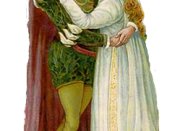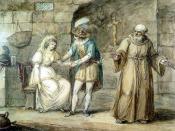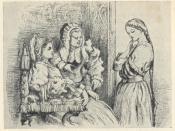Act 3 Scene 1 and Its Significance In The Play
In 1595, William Shakespeare wrote what was to be one of the most celebrated plays of all time. 'Romeo and Juliet' is a tale of "A pair of star-crossed lovers" whose lives are entangled in a vine of fate that leads to their final breath. Both characters were born into an "ancient grudge" that had been fuelled by formidable families, the Capulets and the Montagues. Act 3 Scene 1 twists this love story into that of an ill-fated tragedy, as the death of two lead to two more.
'Romeo and Juliet' is firmly centred on the figures of its hero and heroine. Although characters such as Mercutio are fully developed and have large parts, and so it is the story of Romeo and Juliet themselves that holds the attention of the Elizabethan audience. There is a clear structure: an optimistic and often comic movement up to the marriage at the end of Act II that is swiftly followed by a counter-movement, which begins with the quarrel in Act III Scene 1 and leads to tragedy.
The scene begins with the cautious Benvolio and mischievous Mercutio strolling down the hot streets of fair Verona.
"The day is hot, the Capels are abroad,
And if we meet, we 'scape a brawl,
For now the hot days, is the mad blood stirring."
Mercutio, in his constant state of fearlessness, criticizes Benvolio's cowardly request and ironically suggests that he is the argumentative one.
Mercutio is a very close friend of Romeo. He is one of the most extraordinary characters in all of Shakespeare's plays; Mercutio overflows with imagination, wit, and, at times, a strange satire and menacing enthusiasm. Mercutio loves wordplay, especially double entendres. He can be quite hot-headed,


